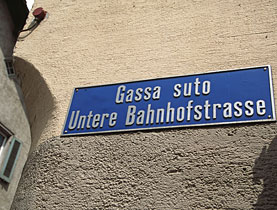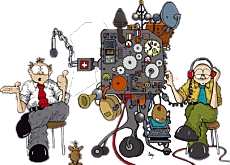How the Swiss watch their language

A book entitled The Swiss Idiotikon - which is still not finished after nearly 150 years - might seem like a foolish enterprise.
But despite its name, it is a work of immense scholarship. The title derives from the Greek word for “peculiar”: the Idiotikon is a comprehensive dictionary of spoken and written German in the form peculiar to Switzerland.
Switzerland has four national languages – German, French, Italian and Romansh – each of which has its own scholarly dictionary in progress.
German, the mother tongue of nearly two thirds of the population, is by far the biggest. But the German spoken in everyday life is not only very different from the standard or High German spoken in Germany, but also varies from area to area within Switzerland.
There is no official written form of the vernacular; instead, Switzerland has always used a more or less standard written language similar to that used in Germany but with some differences of vocabulary.
To put it simply: it’s complicated!
Pride and good will
With such a vast range to deal with it is no wonder that the Idiotikon has taken so long to write. So far 15 volumes have appeared with more than 130,000 headwords; a total of 17 are planned. It covers the language from the Middle Ages to the 21st century.
The idea of the dictionary was launched in 1862 by the Zurich Antiquarian Society and the first volume appeared in 1881.
From the beginning there was a lot of interest in the project, which depended on the goodwill of volunteers to submit examples of words and expressions.
Walter Haas, professor of German Studies at the Fribourg University, explained to swissinfo why there was such enthusiasm.
“The first reason had to do with cultural history: people at that time were afraid that the different dialects were dying out. The second reason was scholarly: people felt that the vernacular was particularly ancient and that material should be collected for the sake of historical linguistic knowledge. And perhaps the third reason was a nationalistic one: a desire to display something that belonged specifically to Switzerland.”
Swiss Germans and their language
Despite the fact that German-speaking Swiss are strongly attached to their spoken language, it has never been taken entirely seriously.
“The vernacular has been very much neglected in schools. It has never been regarded as part of education, but rather as everyday speech that no-one needs to worry about,” Idiotikon editor-in-chief Hans-Peter Schifferle told swissinfo.
One problem with a non-written language is that there are no spelling rules, which naturally poses a problem with ordering the dictionary entries. The first editors chose a system based on word stems, which is logical but highly baffling to the uninitiated.
“We must make every effort to bring this treasure of knowledge to a broad public,” said Schifferle.
“We get several hundred questions every year from ordinary people. The commonest thing they want to know is where a word has come from,” he said. “People are curious, particularly about striking or funny words.
“We see answering these questions as part of our job. But we can’t spend too much time on it since we also have to finish the dictionary.”
The popular interest in Swiss-German is reflected in the successful weekly radio programme “Schnabelweid”, which includes a section for answering listeners’ letters about words and phrases – and this would be impossible without the Idiotikon, as producer Christian Schmid assured swissinfo.
But this very success poses problems. “We want to make the dictionary known, but our presence in the media generates more work. It’s something of a tightrope,” Schifferle admitted.
Finance
It is important to have popular support, since the Idiotikon is largely financed by public money. In the past it has faced real problems. “It survived because the editors were ready to make huge sacrifices,” said Haas.
For a long time the scholars working on it were poorly paid – and women even worse than men.
“That’s why the women’s names didn’t appear on the title pages – they could have used that to ask for more money,” he explained.
Now things are different. The Idiotikon, and its French, Italian and Romansh equivalents, have become part of the scholarly landscape.
“It’s a great help that Switzerland has four languages. If we have four languages, we must compile four dictionaries. That means that each language is protected by the others. But as for loving their language, I am not sure that people don’t actually love their purses more.”
Nevertheless, Haas thinks the future of all four dictionaries is assured.
“The works are so extraordinarily good it would be an absolutely unbelievable act of stupidity to give up on them now,” he said.
swissinfo, Julia Slater
The four national dictionaries are now being compiled under the aegis of the Swiss Academy of Humanities and Social Sciences.
In addition to the Idiotikon they are:
Glossaire des patois de la Suisse romande
Vocabulario dei dialetti della Svizzera italiana
Dicziunari rumantsch grischun
Switzerland has four national languages, German, French, Italian and Romansh.
The spoken forms of the German of Switzerland and the German of Germany became differentiated in mediaeval times.
Spoken Swiss German is largely unintelligible in most of Germany.
There are three main German dialect divisions within Switzerland – although each spills over into the border areas of neighbouring countries.
Apart from a slight difference in accent and vocabulary, the French spoken in Switzerland today is similar to that of France and to the written language.
However, the language originally spoken in western Switzerland was not French but Franco-Provençal, which was also spoken in eastern France and northern Italy. It survives, with difficulty, in local patois, which exist in a range of local variations.
Switzerland’s Italian speakers, in Canton Ticino and parts of Canton Graubünden, use standard Italian, but in private many speak a dialect of Western Lombard, the unofficial language of northern Italy. This dialect exists in many local variations.
Romansh, spoken in parts of Canton Graubünden, exists in five distinct forms, known as “idioms”, each of which also has a written version. The idioms also have their own dialects. An artificial written language, Romansh Grischun, was introduced as an umbrella form in 1982 and is used for official documents.

In compliance with the JTI standards
More: SWI swissinfo.ch certified by the Journalism Trust Initiative











You can find an overview of ongoing debates with our journalists here . Please join us!
If you want to start a conversation about a topic raised in this article or want to report factual errors, email us at english@swissinfo.ch.